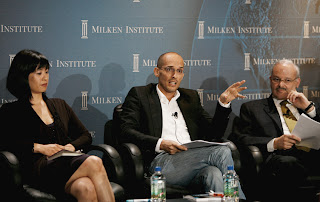A Milken Institute Global Conference session offered attendees a toolbox of ideas to help improve our health and wellbeing – and our chances of celebrating our 100th birthdays. Moderated by Howard Soule of the Milken Institute and Prostate Cancer Foundation, the panel presented diverse points of view on the secrets of longevity, but all agreed that personalized nutrition and exercise plans are key components of a healthful life.
According to Gary Small, director of UCLA’s Longevity
Center, there are things we can do to lower our risk of developing Alzheimer’s
disease, one of the most feared conditions associated with aging. He said that for
Alzheimer’s disease, “genetics is not the whole story,” accounting for only one
third of the risk. The panel agreed that cardiovascular conditioning, stress
management, proper nutrition, and weight control are emerging as critical factors
in reducing risk for Alzheimer’s.
Scientists are learning more about the benefits of regular
exercise. June Chan, a professor of epidemiology from the University of
California San Francisco, described her own work in which she observed that
vigorous exercise is associated with longer prostate cancer survival. In
addition, studies have shown that regular physical exercise is linked to
reduction in plaque associated with Alzheimer’s in patients who are at high
risk for developing the disease.
Luigi Fontana, director of the division of nutrition and aging
at the Italian National Institute of Health, argued that while exercise may
offer some protection against disease, it does not slow the aging process. Instead,
he thinks caloric restriction may have that effect. He noted that in some animal
studies, caloric restriction without malnutrition extends life span by up to 50
percent. However, caloric restriction did not always result in extended life,
which indicates that “possibly each of us may have a peculiar threshold for
caloric restriction.”
Although other panelists stopped short of endorsing extreme
caloric restriction as a universal remedy, they did agree that obesity is a
serious impediment to health and long life. “Man is well adapted to starvation
but poorly adapted to over-nutrition,” said David Heber, director of the UCLA
Center for Human Nutrition. He described how humans have evolved successful strategies
for coping with a low-nutrient environment; when calories are plentiful, these
fat-storage mechanisms can cause problems. Heber stressed the importance of getting
rid of intra-abdominal fat, specifically, and maintaining a proper balance of fat
and lean tissue.
Heber asserted that recommended protein intake levels should
be significantly higher than those included in current USDA guidelines. “People
on low protein diets lose muscle mass over time,” he said. Not all panelists
agreed. Fontana countered that high protein intake is associated with high
rates of cancer and accelerated aging. “We don’t have all the answers,” Small
said.
Fish oil brought the panelists back into accord. All agreed
that fish oil or algae oil, both rich in omega-3 fatty acids, are a beneficial
supplement to a healthy diet. Some panelists cautioned against reliance on
other dietary supplements as they are not regulated by the FDA or properly
evaluated clinically. “Natural is not necessarily safe,” said Small.
Panelists also agreed that stress reduction is critical.
Social interaction, meditation, cultivating a positive outlook, regular
attendance at a house of worship, appropriate sleep periods, and laughter –
according to the panelists, these are all associated with longer life.


No comments:
Post a Comment